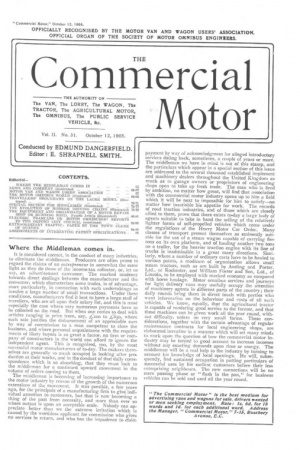Where the Middleman comes in.
Page 1

If you've noticed an error in this article please click here to report it so we can fix it.
It is considered correct, in the conduct of many industries, to eliminate the middleman. Producers are often prone to regard the claims of an entrepreneur in somewhat the same light as they do those of the income-tax collector, or, let us say, an advertisement canvasser. The marked tendency towards direct dealings between the manufacturer and the consumer, which characterises some trades, is of advantage, more particularly, in connection with such undertakings as involve a large number of small transactions. Under these conditions, manufacturers find it best to have a large staff of travellers, who are all upon their salary list, and this is most especially the case where very numerous payments have to be collected on the road. But when one comes to deal with articles ranging in price from, say, ,Z;zoo to ...;65o, where each sale justifies the disbursement of an appreciable sum by way of commission to a man competent to close the business, and where personal acquaintance with the requirements of likely buyers is so great a factor, no firm or company of constructors in the world can afford to ignore the independent agent. This is recognised, too, by the most successful motor manufacturers of to-day. The makers themselves are generally so much occupied in looking after production at their works, and in the conduct of that daily correspondence which is so absorbing, that they must look to the mkIdleman for a continued upward movement in the volume of orders coming to them. The middleman is becoming of increasing importance to the motor industry by reason of the growth of the numerous extensions of the movement. It was possible, a few years ago, for the principals of a manufacturing firm to give individual attention to customers, but that is now becoming a thing of the past from necessity, and more than ever so where output is upon an acceptable scale. Nobody can appreciate better than we the extreme irritation which is caused by the worthless applicant for commission who gives no services in return, and who has the impudence to claim payment by way of acknowledgment for alleged introductory services dating back, sometimes, a couple of years or more.
The middleman we have in mind is not of this stamp, and the particulars which appear in a special section of this issue are addressed to the several thousand established implement and machinery dealers throughout the United Kingdom as much as to garage owners or proprietors of engineering shops open to take up fresh trade. The man who is fired
by ambition, no matter how great, will find that association with the commercial motor industry opens up to him a field which it will be next to impossible for him to satisfy—no matter how insatiable his appetite for work. The records of road traction industries, and of those which are closely allied to them, prove that there exists to-day a large body of agents suitable to take in hand the selling of the relatively lighter forms of self-propelled vehicles which come under the regulations of the Heavy Motor Car Order. Many classes of transport present themselves as eminently suitable for the use of a steam wagon capable of carrying five tons on its own platform, and of hauling another two tons on a trailer, for the heavier traction engine with its line of trucks is inadmissible in a great many directions. Similarly, where a number of ordinary carts have to be hauled to various points, a modicum of organisation allows small steam tractors, such as are built by Aveling and Porter, Ltd., ot Rochester, and William Foster and Son, Ltd., of Lincoln, to be employed with marked economy as compared with horse haulage. Motor omnibus services and journeys for light delivery vans may usefully occupy the attention of machinery agents in different parts of the country ; their daily rounds bring them in direct touch with parties who want information on the behaviour and costs of all such vehicles. We know, equally, that the agricultural tractor is capable of rendering good service to the farmer, and that these machines can be given work all the year round, without difficulty, unless on very small farms. These considerations, together with the certain advantage of regular maintenance contracts for local engineering shops, are elaborated hereafter in a manner which will set many minds to work upon the question of how the commercial motor industry may be turned to good account to increase incomes without any exacting demands upon time or energy. The
middleman be a real help to the industry by turning to account his knowledge of local openings. He will, subsequently, find sustained occupation in putting particulars of successful uses by his earliest customers before their less enterprising neighbours. The new connections will be no mere passing phase or "flash in the pan," for business vehicles can be sold and used all the year round.






















